unit4补充短语和知识点
- 格式:doc
- 大小:49.50 KB
- 文档页数:8
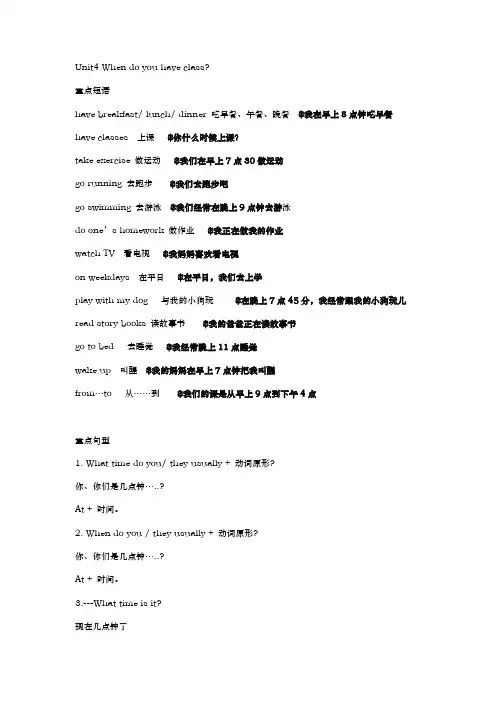
Unit4 When do you have class?重点短语have breakfast/ lunch/ dinner 吃早餐、午餐、晚餐$我在早上8点钟吃早餐have classes 上课$你什么时候上课?take exercise 做运动$我们在早上7点30做运动go running 去跑步$我们去跑步吧go swimming 去游泳$我们经常在晚上9点钟去游泳do one’s homework 做作业$我正在做我的作业watch TV 看电视$我妈妈喜欢看电视on weekdays 在平日$在平日,我们去上学play with my dog 与我的小狗玩$在晚上7点45分,我经常跟我的小狗玩儿read story books 读故事书$我的爸爸正在读故事书go to bed 去睡觉$我经常晚上11点睡觉wake up 叫醒$我的妈妈在早上7点钟把我叫醒from…to 从……到$我们的课是从早上9点到下午4点重点句型1. What time do you/ they usually + 动词原形?你、你们是几点钟…..?At + 时间。
2. When do you / they usually + 动词原形?你、你们是几点钟…..?At + 时间。
3.---What time is it?现在几点钟了--It’s +时间。
句型练习根据中文提示把句子补充完整。
1. time you usually have ? (你通常几点吃早餐)2. I breakfast 7o’clock in the . (我通常早上7点吃早餐)3. do have ? (你什么时候上课呢)4. I have class 8 o’clock in the morning 4:30 in the afternoon.(我们从早上8点到下午4点半有课。
)5. -- you ( take) exercise ? (你进行体育锻炼吗)-- I usually go (run) or (swim) the afternoon from 4:30 to 5:30.我通常在下午4点半到5点半跑步或者游泳四、知识考点【知识考点一】from....to.... 从......到......from....to..... 可指时间、地点、数字的“从...到...”Beijing Shanghai10:00 11:00 in the morning【知识考点二】1 take exercise 进行体育锻炼do exercise = take exerciseHe every day.=He exercise every day.跟take有关的短语take pictures: 拍照take off: 起飞,脱衣服take care of: 照顾【知识考点三】go running: 去跑步It’s time ________ __________ running. 到去跑步的时间了。
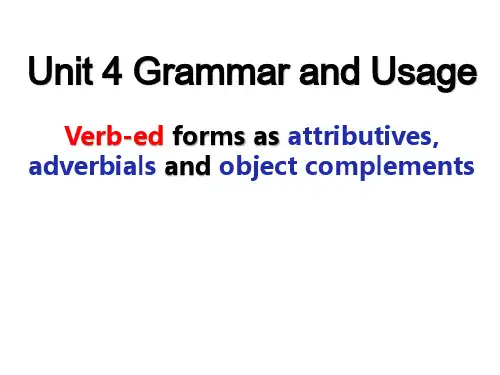
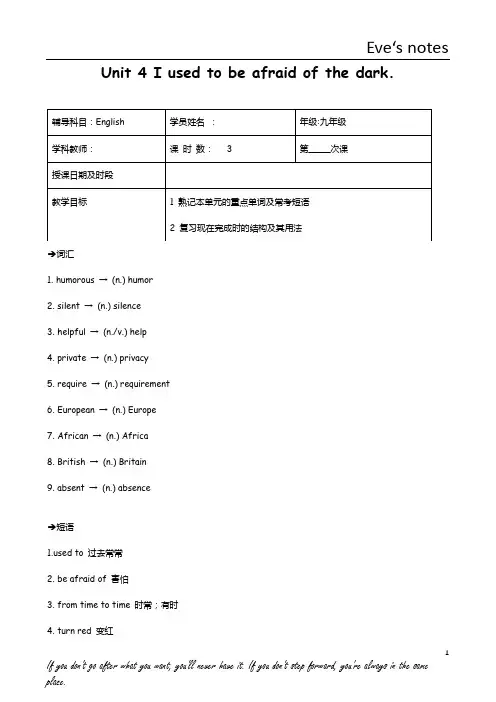
Unit 4 I used to be afraid of the dark.→词汇1. humorous →(n.) humor2. silent →(n.) silence3. helpful →(n./v.) help4. private →(n.) privacy5. require →(n.) requirement6. European →(n.) Europe7. African →(n.) Africa8. British →(n.) Britain9. absent →(n.) absence→短语ed to 过去常常2. be afraid of 害怕3. from time to time 时常;有时4. turn red 变红5. take up 开始做6. deal with 对付;应付7. not ⋯anymore/ no longer 不再8. tons of attention 很多关注9. worry about 为⋯担忧10. be careful 当心11. hang out 闲逛12. give up 放弃13. think about 考虑14. a very small number of ⋯极少数的⋯15. be alone 独处16. give a speech 作演讲17. in public 当众18. all the time 一直;总是19. on the soccer team 在足球队20. be proud of/ take pride in 为⋯骄傲21. be interested in 对⋯感兴趣22. make a decision 做决定23. in person 亲自24. to one ’s surprise 令某人吃惊的是25. change one ’s life 改变某人的生活26. even though 尽管27. take care of/ look after 照顾28. think of 关心;想着29. pay attention to 对⋯注意;留心30. in the last few years 在过去的几年里句型1. used to do sth. 过去常常做某事2. be afraid of doing sth. 害怕做某事3. have to do sth. 必须做某事4. make sb. do sth. 让某人做某事5. give up doing sth. 放弃做某事6. try to do sth. 尽力做某事7. adj. + enough to do sth. 足够⋯而能够做某事8. be prepared to do sth. 准备做某事9. see sb. doing sth. 看见某人在做某事10. take up doing sth. 开始做某事11. begin to do sth. 开始做某事12. require sb. to do sth. 要求某人做某事13. decide to do sth. 决定做某事14. make a decision to do sth. 决定做某事15. It ’s hard to believe that ⋯很难相信⋯16. It has been + 一段时间+ since + 从句自从⋯以来已经有很长时间了17. dare to do sth. 敢于做某事18. It ’s + adj. + for sb. + to do sth. 对某人来说做某事是⋯的→语法Used to do sth→要点解析1. She was never brave enough to ask questions. 她从来不够勇敢而不敢问问题。
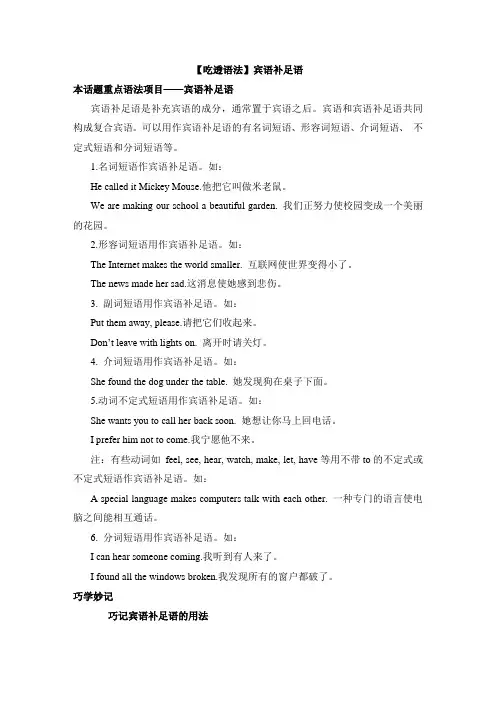
【吃透语法】宾语补足语本话题重点语法项目——宾语补足语宾语补足语是补充宾语的成分,通常置于宾语之后。
宾语和宾语补足语共同构成复合宾语。
可以用作宾语补足语的有名词短语、形容词短语、介词短语、不定式短语和分词短语等。
1.名词短语作宾语补足语。
如:He called it Mickey Mouse.他把它叫做米老鼠。
We are making our school a beautiful garden. 我们正努力使校园变成一个美丽的花园。
2.形容词短语用作宾语补足语。
如:The Internet makes the world smaller. 互联网使世界变得小了。
The news made her sad.这消息使她感到悲伤。
3. 副词短语用作宾语补足语。
如:Put them away, please.请把它们收起来。
Don’t leave with lights on. 离开时请关灯。
4. 介词短语用作宾语补足语。
如:She found the dog under the table. 她发现狗在桌子下面。
5.动词不定式短语用作宾语补足语。
如:She wants you to call her back soon. 她想让你马上回电话。
I prefer him not to come.我宁愿他不来。
注:有些动词如feel, see, hear, watch, make, let, have等用不带to的不定式或不定式短语作宾语补足语。
如:A special language makes computers talk with each other. 一种专门的语言使电脑之间能相互通话。
6. 分词短语用作宾语补足语。
如:I can hear someone coming.我听到有人来了。
I found all the windows broken.我发现所有的窗户都破了。
巧学妙记巧记宾语补足语的用法宾补即是(足)宾语,通常置于宾语后;名、形、介、副均可用,分词亦可作宾补;不定式,要带to,有些动词to可省;看到(see)注视(watch)有(have)感觉(feel),听到(hear)使(make)让(let)真特殊。
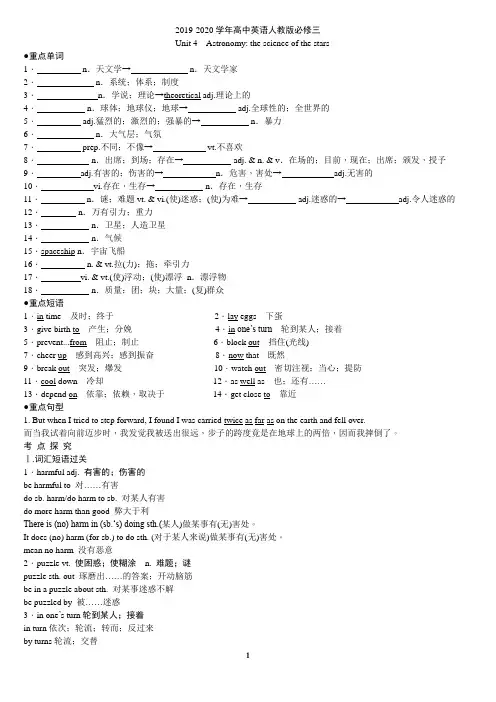
2019-2020学年高中英语人教版必修三Unit 4Astronomy: the science of the stars●重点单词1.__________ n.天文学→_____________ n.天文学家2._____________ n.系统;体系;制度3.______________n.学说;理论→theoretical adj.理论上的4.___________ n.球体;地球仪;地球→___________ adj.全球性的;全世界的5.__________ adj.猛烈的;激烈的;强暴的→___________ n.暴力6._____________ n.大气层;气氛7.__________ prep.不同;不像→____________ vt.不喜欢8.____________ n.出席;到场;存在→___________ adj. & n. & v.在场的;目前,现在;出席;颁发,授予9.__________adj.有害的;伤害的→____________n.危害,害处→____________adj.无害的10.____________vi.存在,生存→___________ n.存在,生存11.__________ n.谜;难题vt. & vi.(使)迷惑;(使)为难→___________ adj.迷惑的→____________adj.令人迷惑的12.________ n.万有引力;重力13.___________ n.卫星;人造卫星14.___________ n.气候15.spaceship n.宇宙飞船16.__________ n. & vt.拉(力);拖;牵引力17._________vi. & vt.(使)浮动;(使)漂浮n.漂浮物18.___________ n.质量;团;块;大量;(复)群众●重点短语1.in time及时;终于2.lay eggs 下蛋3.give birth to 产生;分娩4.in one’s turn 轮到某人;接着5.prevent...from 阻止;制止6.block out 挡住(光线)7.cheer up 感到高兴;感到振奋8.now that 既然9.break out 突发;爆发10.watch out 密切注视;当心;提防11.cool down 冷却12.as well as 也;还有……13.depend on 依靠;依赖,取决于14.get close to 靠近●重点句型1. But when I tried to step forward, I found I was carried twice as far as on the earth and fell over.而当我试着向前迈步时,我发觉我被送出很远,步子的跨度竟是在地球上的两倍,因而我摔倒了。
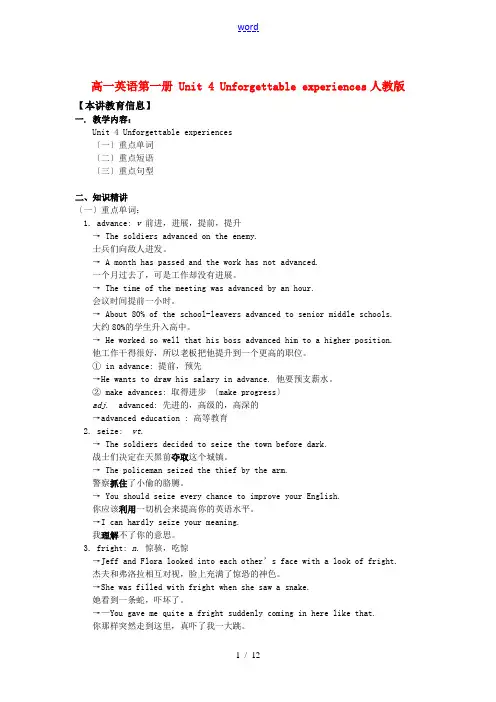
高一英语第一册 Unit 4 Unforgettable experiences人教版【本讲教育信息】一. 教学内容:Unit 4 Unforgettable experiences〔一〕重点单词〔二〕重点短语〔三〕重点句型二、知识精讲〔一〕重点单词:1. advance: v前进,进展,提前,提升→ The soldiers advanced on the enemy.士兵们向敌人进发。
→ A month has passed and the work has not advanced.一个月过去了,可是工作却没有进展。
→ The time of the meeting was advanced by an hour.会议时间提前一小时。
→ About 80% of the school-leavers advanced to senior middle schools.大约80%的学生升入高中。
→ He worked so well that his boss advanced him to a higher position.他工作干得很好,所以老板把他提升到一个更高的职位。
① in advance: 提前,预先→He wants to draw his salary in advance. 他要预支薪水。
② make advances: 取得进步〔make progress〕adj. advanced: 先进的,高级的,高深的→advanced education : 高等教育2. seize: vt.→ The soldiers decided to seize the town before dark.战士们决定在天黑前夺取这个城镇。
→ The policeman seized the thief by the arm.警察抓住了小偷的胳膊。
→ You should seize every chance to improve your English.你应该利用一切机会来提高你的英语水平。
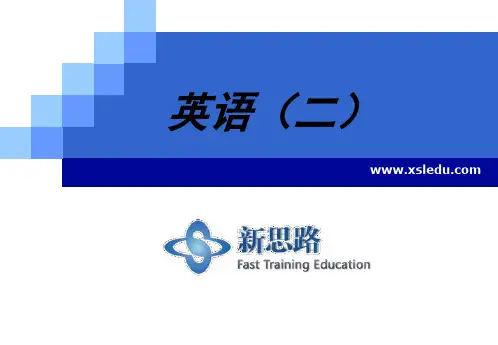
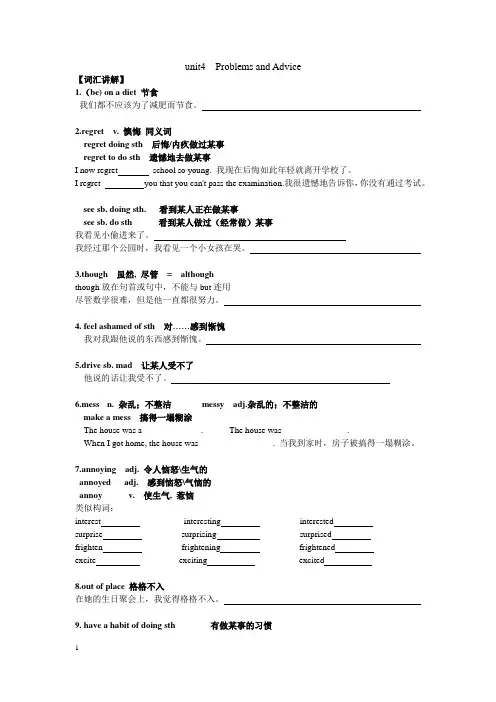
unit4 Problems and Advice【词汇讲解】1.(be) on a diet 节食我们都不应该为了减肥而节食。
2.regret v. 懊悔同义词regret doing sth 后悔/内疚做过某事regret to do sth 遗憾地去做某事I now regret school so young. 我现在后悔如此年轻就离开学校了。
I regret you that you can't pass the examination.我很遗憾地告诉你,你没有通过考试。
see sb. doing sth. 看到某人正在做某事see sb. do sth 看到某人做过(经常做)某事我看见小偷进来了。
我经过那个公园时,我看见一个小女孩在哭。
3.though 虽然, 尽管= althoughthough放在句首或句中,不能与but连用尽管数学很难,但是他一直都很努力。
4.feel ashamed of sth 对……感到惭愧我对我跟他说的东西感到惭愧。
5.drive sb. mad 让某人受不了他说的话让我受不了。
6.mess n. 杂乱;不整洁messy adj.杂乱的;不整洁的make a mess 搞得一塌糊涂The house was a _____________. The house was _____________.When I got home, the house was _______________. 当我到家时,房子被搞得一塌糊涂。
7.annoying adj. 令人恼怒\生气的annoyed adj. 感到恼怒\气恼的annoy v. 使生气, 惹恼类似构词:interest interesting interestedsurprise surprising surprisedfrighten frightening frightenedexcite exciting excited8.out of place 格格不入在她的生日聚会上,我觉得格格不入。
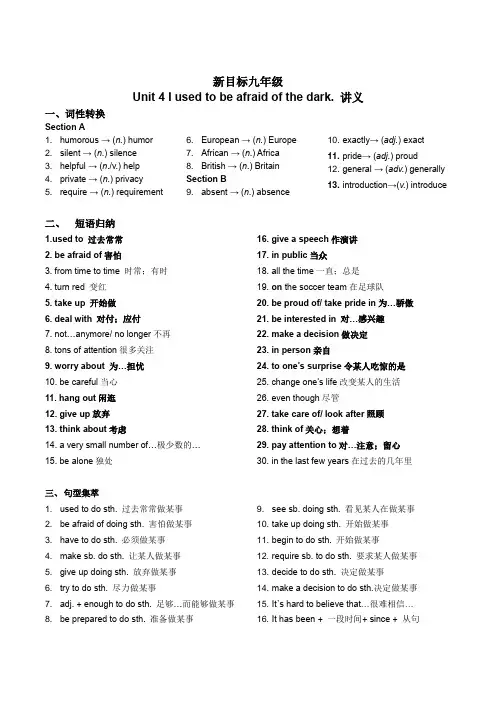
新目标九年级Unit 4 I used to be afraid of the dark. 讲义一、词性转换Section A1. humorous → (n.) humor2. silent → (n.) silence3. helpful → (n./v.) help4. private → (n.) privacy5. require → (n.) requirement6. European → (n.) Europe7. African → (n.) Africa8. British → (n.) BritainSection B9. absent → (n.) absence10. exactly→ (adj.) exact11. pride→ (adj.) proud12. general → (adv.) generally13. introduction→(v.) introduce二、短语归纳ed to 过去常常2. be afraid of害怕3. from time to time 时常;有时4. turn red 变红5. take up 开始做6. deal with 对付;应付7. not…anymore/ no longer不再8. tons of attention很多关注9. worry about 为…担忧10. be careful当心11. hang out闲逛12. give up放弃13. think about考虑14. a very small number of…极少数的…15. be alone独处16. give a speech作演讲17. in public当众18. all the time一直;总是19. on the soccer team在足球队20. be proud of/ take pride in为…骄傲21. be interested in 对…感兴趣22. make a decision做决定23. in person亲自24. to one’s surprise令某人吃惊的是25. change one’s life改变某人的生活26. even though尽管27. take care of/ look after照顾28. think of关心;想着29. pay attention to对…注意;留心30. in the last few years在过去的几年里三、句型集萃1. used to do sth. 过去常常做某事2. be afraid of doing sth. 害怕做某事3. have to do sth. 必须做某事4. make sb. do sth. 让某人做某事5. give up doing sth. 放弃做某事6. try to do sth. 尽力做某事7. adj. + enough to do sth. 足够…而能够做某事8. be prepared to do sth. 准备做某事9. see sb. doing sth. 看见某人在做某事10. take up doing sth. 开始做某事11. begin to do sth. 开始做某事12. require sb. to do sth. 要求某人做某事13. decide to do sth. 决定做某事14. make a decision to do sth.决定做某事15. It’s hard to believe that…很难相信…16. It has been + 一段时间+ since + 从句自从…以来已经有很长时间了17. dare to do sth. 敢于做某事18. It’s + adj. + for sb. + to do sth.对某人来说做某事是…的四、重点句子1. She was never brave enough to ask questions. 她从来不够勇敢而不敢问问题。
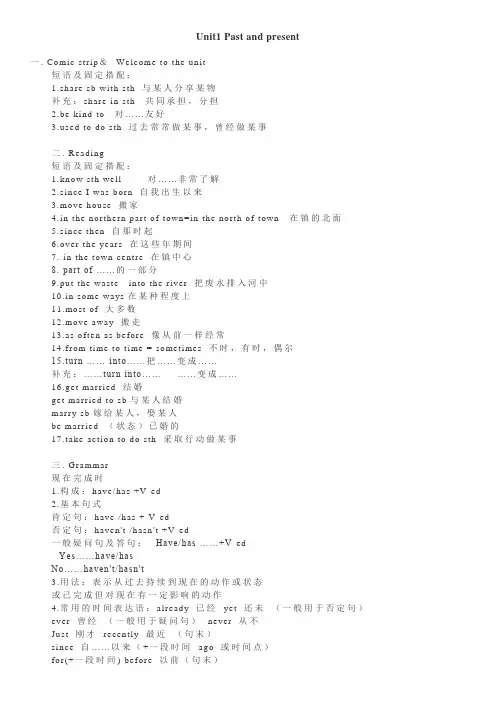
Unit1 Past and present一. Comic strip&Welcome to the unit短语及固定搭配:1.share sb with sth 与某人分享某物补充:share in sth 共同承担,分担2.be kind to 对……友好ed to do sth 过去常常做某事,曾经做某事二. Reading短语及固定搭配:1.know sth well 对……非常了解2.since I was born 自我出生以来3.move house 搬家4.in the northern part of town=in the north of town 在镇的北面5.since then 自那时起6.over the years 在这些年期间7. in the town centre 在镇中心8. part of ……的一部分9.put the waste into the river 把废水排入河中10.in some wa ys在某种程度上11.most of 大多数12.move awa y 搬走13.as often as before 像从前一样经常14.from time to time = sometimes 不时,有时,偶尔15.turn …… into……把……变成……补充:……turn into…… ……变成……16.get married 结婚get married to sb与某人结婚marr y sb嫁给某人,娶某人be married (状态)已婚的17.take action to do sth 采取行动做某事三. Grammar现在完成时1.构成:have/has +V-ed2.基本句式肯定句:have /has + V-ed否定句:haven't /hasn't +V-ed一般疑问句及答句:--Have/has ……+V-ed--Yes……have/hasNo……haven't/ha sn't3.用法:表示从过去持续到现在的动作或状态或已完成但对现在有一定影响的动作4.常用的时间表达语:already 已经yet 还未(一般用于否定句)ever 曾经(一般用于疑问句)never 从不J ust 刚才recently 最近(句末)since 自……以来(+一段时间ago 或时间点)for(+一段时间) before 以前(句末)5.过去分词变化①与动词原形相同如come→came→come②与动词过去式相同如get→got→got③在动词原形后面+en 如eat→ate→eaten④在以e结尾的动词原形后面+n如drive→drove→driven⑤在动词过去式后面+n 如break→broke →broken⑥一些特殊的变化举例略参见书本P122-123四. Integrated skills短语及固定搭配:1.local people 本地人2.go abroad 出国e back = return 返回4.keep in touch 保持联系5.borrow from sb 借进来lend to sb 借出去6.hope(that)+从句希望……hope to do sth希望做某事7.keep in touch with sb 与某人保持联系补充:lose in touch with sb 与某人失去联系municate with sb = have communication with sb与某人交谈句子:1.The Internet makes communication mu ch easier 网络使交流简单得多2.Starlight Town ha s changed a lot/greatly over the years=Amazing/great changes have taken place in Starlight Town over the years星光镇这些年变化巨大五. study skills事实和观点:Facts (事实):是对事物的客观陈述,不掺杂任何人的主观感情,意识Opinions(观点):观点是从人的一定立场或角度出发,对事物、事件的看法观点不一定属实:阅读时,要根据不同的文体,用不同的方法分清事实和观点;写作时,我们要学会运用事实来制成自己的观点,使我们的观点更有说服力短语及固定搭配:1.be/get used to doing sth 习惯于做某事2.on one's own = alone = by oneself 亲自3.spend time on 在……花时间六. Task短语及固定搭配:1.listen to the radio 听收音机2.enjoy a comfor table life 过着舒适的生活3.make sb do sth 使某人做某事补充:make sb /sth+名词e.g. We made J ack our monitor 我们选举jack当班长句子:1.Now the streets are wide and clean with man y green trees on both sides现在街道又宽又干净,两处绿树掩映2.Many fa milies even has their own cars 许多家庭甚至有了私家车Unit2 Travelling一. Comic strip &Welcome to the Unit短语及固定搭配:1.get all my things 带上我所有的东西2.so excited 如此的激动3.places of interest 名胜4.the capital of ……的首都5.go to ……for holida y 去……度假6.be/get ready to do sth 准备好做某事be/get ready for sth 准备好某事7.have been to 去过某地(已回)have gone to 去了某地(未回)have been in 去某地(在该地)句子:I don't think it'll be a holiday for me 我认为这对我而言不是一个假期补充:常见的否定前置词:think,believe等二. Reading短语及固定搭配:1.haven't seen each other 没有见到彼此2.have been in Hong Kong for two days在香港两天3.have a fantastic time 度过一段美妙的时光=have fun 玩得开心=have a good/great /nice /wonderful time 过得愉快=enjoy oneself 玩得开心,过得愉快4.roller coaster 过山车5.move at high(/top/full)speed 高速运动补充:at low speed 低速6.through the ride 在乘坐的过程中7.have a quick meal 吃一份简餐8.on the way 在路上on the way to 在……的路上补充:与way有关的短语1.in some wa ys(同步练习上介绍的是:in a way)在某种程度上2.by the wa y 顺便问一下3.in one's wa y 挡住某人的去路4.lost one's wa y 迷路5.all the wa y 一路上,沿路6.one the way 在路上,即将发生7.make one's wa y 某人动身(去某处),前进8.find one's wa y 找到路,找到解决方法9.such as 例如(一般后面跟多个例子)10.get excited 兴奋起来11. a parade of ……的游行ter in the afternoon= in the later afternoon 傍晚13.the best part of the day一天中最好的部分14.take photos 拍照15.a 4-D film 一场4D电影16.do some shopping 购物17.a couple of 一对,几个18.let me have a look 让我看看19.at the speed of 以……的速度20.hurry to do sth 赶着做某事22.can't stop doing sth 忍不住做某事,情不自禁做某事23.take photos of 拍……的照片24.be like 像(可指外貌或者品质)look like 像(单指外貌)25.buy sb sthbuy sth for sb26.in front of 在……(外部的)前面in the front of 在……(内部的)前面27.at the end of 在……的末尾in the end(=finally=at las t) 最后by the end of(通常加时间词)到……为止三. Grammarhave/has been 与have/has gone 的区别have/has been表示某人曾经去过某地,并且已经回来了e.g. He has been to the Great Wall twice 他曾经去过长城两次have/has gone 表示某人已经去了某地,但还没回来e.g. He has gone to the cinema 他去看电影了for 和since 的用法for+时间段e.g. He has been awa y fro m China for two years他离开中国已有两年了since+时间点/时间段+agoe.g. He has lived in Nanjing since 2010 自2010以来,他一直住在南京补充:since+从句e.g. Great changes have taken place since you left自从你离开,就发生了很大的变化It is +一段时间+since+从句e.g. It is years s ince I graduated from University自从我大学毕业以来已经有两年了带时间状语的现在完成时的句子中,谓语动词中短暂性动词需转换为延续性动词四. Integrated Skills短语及固定搭配:1.in any season 在任何季节2.all yea round 全年,一年到头3.love water sports 热爱水上运动4.go there in any season except winter 除了冬天的任何一个季节去那5.on cold and Snowy da ys 在寒冷的下雪天6.on busines s 出差7.take a direct flight to Cheng Du 直飞成都句子:1.The best time g o there is in spring or autumn 去那的最好时间是春天或秋天2.Do you have any plans for the May Da y holida ys 五一假期有什么打算3.Howlong does it take to fly to Cheng Du 乘飞机到成都要多久五. Study skills主旨和细节主旨(main points)是作者思想和写作意图在文中的集中体现,起着统率和支配全文的作用。
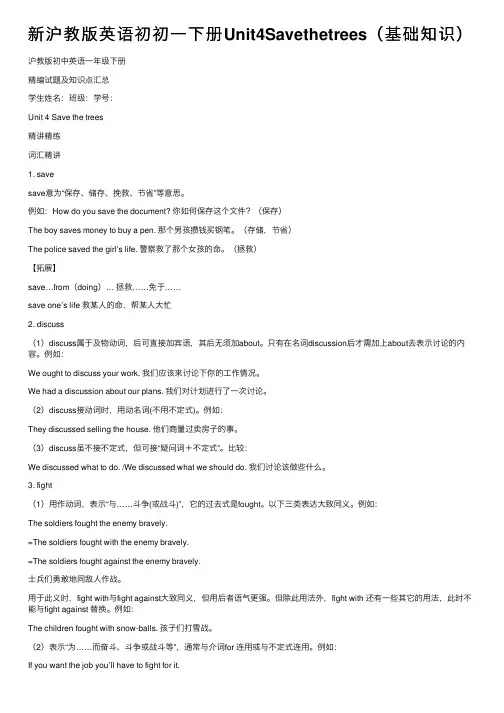
新沪教版英语初初⼀下册Unit4Savethetrees(基础知识)沪教版初中英语⼀年级下册精编试题及知识点汇总学⽣姓名:班级:学号:Unit 4 Save the trees精讲精练词汇精讲1. savesave意为“保存、储存、挽救、节省”等意思。
例如:How do you save the document? 你如何保存这个⽂件?(保存)The boy saves money to buy a pen. 那个男孩攒钱买钢笔。
(存储,节省)The police saved the girl’s life. 警察救了那个⼥孩的命。
(拯救)【拓展】save…from(doing)… 拯救……免于……save one’s life 救某⼈的命,帮某⼈⼤忙2. discuss(1)discuss属于及物动词,后可直接加宾语,其后⽆须加about。
只有在名词discussion后才需加上about去表⽰讨论的内容。
例如:We ought to discuss your work. 我们应该来讨论下你的⼯作情况。
We had a discussion about our plans. 我们对计划进⾏了⼀次讨论。
(2)discuss接动词时,⽤动名词(不⽤不定式)。
例如:They discussed selling the house. 他们商量过卖房⼦的事。
(3)discuss虽不接不定式,但可接“疑问词+不定式”。
⽐较:We discussed what to do. /We discussed what we should do. 我们讨论该做些什么。
3. fight(1)⽤作动词,表⽰“与……⽃争(或战⽃)”,它的过去式是fought。
以下三类表达⼤致同义。
例如:The soldiers fought the enemy bravely.=The soldiers fought with the enemy bravely.=The soldiers fought against the enemy bravely.⼠兵们勇敢地同敌⼈作战。
Unit4 History and traditions Section 2-3重点词汇短语句型Section21.charge用法详解(1)vt.给......充电Before use,the battery must be charged.电池使用前必须充电。
(2)vt.收费;要价Charge sb.(money)for sth. 因某事向某人收费。
We won’t charge you for delivery.我们送货不收取你的费用。
(3)vt.控告;职责;谴责Charge sb. with(doing)sth. 因做某事而谴责/控告某人He was charged with murder.他被指控犯有谋杀罪。
(4)n.要价,收费admission charges 入场费free of charge 免费Delivery is free of charge.免费送货。
(5)n.【U】主管;掌管take charge of 主管;掌管in charge of 负责/主管in the charge of 负责/主管in the charge of=in one’s charge 由......负责/主管He took charge of the farm after his father’s death.他在父亲去世后掌管了农场。
I’m leaving the school in your charge.我这就把学校交给你掌管。
特别注意表示“因......控告......”的短语:accuse ...... of......2.announce用法详解(1)vt.宣布;宣告(决定,计划等);(尤指通过广播)通知announce sth.(to sb.)(向某人)宣布某事announce that......宣布......;通知......It is announced that...... 据宣布......They officially announced the news to the reporters. 他们正式向记者发布了这条新闻。
Unit4 What’s the best movie theater?一、词汇运用for tab le sea t s舒适的座位2.b ig sc reens大屏幕3.c lose to home 离家近4.the shor tes t wai t ing t ime等待时间最短5.in town 在城里6.welcome to...欢迎来到……7.so fa r到目前为止;迄今为止8.a round the world全世界9.look fo r寻找10.and so on等等11.have...in com m on 有相同特征;(想法、兴趣等方面)相同12.a l l k inds o f各种类型的;各种各样的13.be up to是……的职责;由……决定14.make up编造(故事、谎言等);组成,构成;补充,补足;化妆15.for example例如16.take...se r ious ly认真对待……17.make one’s dream come true 实现某人的愿望或梦想18.a b ig p la te o f du mpl ings一大盘饺子19.take walks散步20.thanks fo r(doing)s th.因为(做)某事而感谢21.be good a t(doing)s th.擅长于(做)某事22.watch sb. do s th.看见某人做某事23.p lay a ro le in(do ing)s th.在……中扮演角色;在(做)某事中发挥作用;对(做) 某事有影响24.no p rob lem 不用谢;不客气;没问题二、词汇精讲fortable seats(1) comfortable 是形容词,意为“舒适的,安逸的”。
其名词和动词形式为 comfort,意为“使舒适,安慰”,其副词形式为 comfortably 意为“舒适地;安逸地”,反义词为 uncomfortable“不舒适的,不安逸的”。
知识点大全SA基本句型1(询问与表述情况)What’s wrong (with you)? (你)怎么啦?I have to study too much so I don’t get enough sleep. 我必须学太多东西了因此我得不到充足的睡眠。
What’s wrong with Peter? 皮特怎么啦?He has too much homework so he doesn’t have any free time to do things he likes. 他有太多作业因此他没有一些自由的时间去做他喜欢的。
What’s the problem? 问题是什么?My parents don’t allow me to hang out with my friends. 我的父母不让我和朋友们闲逛。
What’s the problem with Sarah? 莎拉的问题是什么?She has too many after-school classes. 她有太多课外辅导班了。
What’s the matter (with you)? (你)怎么啦?I got into a fight with my best friend. 我和我最好的朋友打架了。
说明:所给的基本句型要求全部识记,具体涉及的语言知识后面会介绍。
基本句型2(提出建议)Maybe you could sleep earlier this evening. 或许你可以今晚早睡一些。
I guess you should talk about it with your parents. 我猜你应该和你父母聊聊这件事。
Why don’t you call up your friend a nd say you are sorry? 你为何不给你朋友打电话并且说你很抱歉呢?Why not buy your friend a gift? 为何不给你朋友买一件礼物呢?How/What about writing him a letter? 给他写一封信怎么样?You’d better say sorry to him. 你最好和他说抱歉。
Unit 4 Don’t eat in class.补充短语和知识点一、重点词组及短语:4.dining hall饭厅,餐厅5. in class 在课堂上in the classroom 在教室里6.on time准时(in time及时)7. eat in the classroom 在教室里吃东西10.school uniforms校服11. wear uniforms穿制服12.I see我明白了13. have to do sth. 不得不做某事15.according to根据,依据17.share (sth )with sb和某人分享(…)18. on school days在上学期间19. on school nights在校期间的晚上20. practice (playing) the piano 练习弹钢琴[practice doing …练习做…]21.go out外出23.clean (one’s) room打扫房间24.do the dishes洗餐具25. too many/much太多的(可数/不可数)much too 太26.make (one’s) bed铺床27.go to bed去睡觉(be in bed 在床上)28.think about (sb/sth/doing sth)考虑(某人/某物/做某事)30.learn to do sth学(做某事)learn from sb 向…学习31. Don't talk. = No talking.不要说话。
32.bring…to…把……带来……33.keep + 宾语+形容词使……保持某种状态34.keep one’s hair short 留短发35. make breakfast 做早饭37.in bed “睡觉,卧床”in hospital在住院in the hospital在医院里at table 在吃饭at the table在桌子边38.follow sb to do sth 跟着某人做某事二、知识点解析1.Don’t fight.不要打架。
fight作动词,意为“打架、打仗”。
其过去式为fought.●fight for“为…而斗争”,后面常接抽象名词,表示为事业、自由等而斗争。
Eg:They are fighting for freedom.他们正为自由而战。
●fight against“为反对…而战斗”,后接事物名词、人和国家名词。
Eg: They fought against the enemy.他们和敌人作战。
●fight with“和…打架”,“同…(并肩)战斗”,后只接表示人或国家的名词。
Eg:Don’t fight with him.不要和他打架。
2..Ms./Mrs./Miss.●Ms.:“女士”,用于婚姻状况不明或不想区分婚否的女子的姓前。
●Mrs.:“夫人”,用于已婚女子姓前。
Madam:也用于已婚女子,意为“夫人、女士”,一般单独使用,不与姓连用●Miss.:“小姐”用于未婚女子姓前,还常用于年轻的女教师的姓前,可译为“老师”。
4. ●on time“准时,按时”,指按规定的时刻不早不晚。
Eg:He always go to school on time.他总是按时上学。
●in time“及时”,指没有迟到,时间还充裕。
Eg:Fireman reached the house on fire in time.消防员及时赶到那幢失火的房子。
5.hear、listen和sound都有"听"的意思,但三者是有区别的:●hear"听说"侧重于"听"的内容。
Eg:I'm sorry to hear that you are ill. 听说你生病了我很难过。
I never heard such an interesting story. 我从来没听过这么有趣的一个故事。
●listen"听"侧重于"听"这一动作。
Eg:Listen to me carefully. 认真听我说。
The children like to listen to music. 孩子们喜欢听音乐。
●sound"听起来"它是系动词后面接形容词等。
Eg:That sounds great. 那听起来真不错。
It sounds like fun. 听起来挺有趣。
【典型例题】________carefully,or you are not able to________anything. (be able to do sth 能够做…)A.Hear;listenB.Listen;hearC.Hear;listenD.Listen;listen6.辨析take,bring●take“带走,拿走”指把东西从说话地带到别的地方。
Eg:Can you help me to take the books to the classroom?你能帮我把这些书带到教室里去吗?●bring“带来”指把东西从别处带到说话地。
Eg:Bring your homework here tomorrow,please.请你明天把作业带到这儿来。
【典型例题】________away this dirty shirt and ________me a clean one.A.Take;bringB.Take;takeC.Bring;takeD.Bring;bring8.remember“记得,记住”,是及物动词,可以直接加名词。
●remember doing sth记得已做某事(已做)Eg:I remember seeing him once.我记得见过他一次。
●remember to do sth 记得要做某事(还没做)Eg:Remember to post the letter for me.记得给我寄这封信。
●forget“忘记,忘了”,作remember反义词时,用法和remember相同。
9.help作动词意为“帮助”,常用的结构有:●help sb (to) do sth帮助某人做某事●help sb with sth(n.)帮助某人做某事Eg:I often help him with his lessons.我常帮他学功课。
●help oneself(myself/yourself/herself…) to+n.请随便用…Eg:Please help yourselves to some fruit.请随便吃些水果。
help还可作名词,表示“帮助”,是不可数。
10.too mang,too much与much too【典型例题】I have ________skirts and this one is ________large for me,so you can take it if you like.A. too many; too muchB. too much; much tooC. too many; much too11.either,too与also【典型例题】I don’t like her, ________.A.alsoB.tooC.eitherD.to10.have fun=have a good time=enjoy oneself玩得开心,过得愉快12.be in bed "在床上、卧床",in 和bed之间不能用冠词,bed也不用复数。
Eg:He is in bed for 10 years. 他卧床10年了。
Dave has to be in bed early every night.大卫每晚必须很早睡觉。
.13.No talking ! "禁止交谈。
"no后面加上名词或动名词doing也表示不要做某事。
与don't +do的用法相似。
Eg:No wet umbrellas! / Don't put wet umbrellas here! 禁止放湿雨伞No food! Don't eat food here! 禁止吃食物No smoking! Don't smoke here! 禁止吸烟14. by + 时间:在……之前by Monday 在星期一之前by 10 o’clock在十点之前by + 交通工具:乘某种交通工具by the way顺便问(说)一下15.with的用法(1) with 和;如:with my parents. (不能用and)(2) with 戴着;如:Do you know the fat man with a hat? (不能用wears)(3) with 有着;如:It’s an old house with a beautiful garden. (不能用has)16.else / other 别的,其他的else修饰疑问词或不定代词,位于其后。
Other修饰名词,位于名词前。
What else do you have to do? 你们还必须做什么事?I have something else to tell you.我还有别的事情要告诉你。
Where are the other boys? 其他的男孩在哪儿?17.我从来没有任何快乐:(never译为“从来没有”,表示否定,否定句中表示“任何,一些”,用any)。